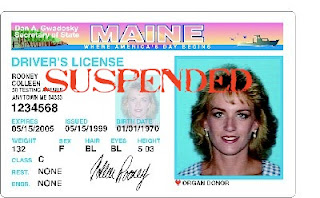 |
| kirstyhall from flickr |
As of this writing, the Maine Supreme Judicial Court has published 138 opinions in 2012 and 43 of them took up Criminal matters. By my count, 11 of those resulted in reversal of some type, but a few were either hollow victories or did not interest me. Here is my year-end wrap up of 8 cases where the defense won, and maybe made some good law. Here they are in the order decided. If there is anything I missed, post it in the comments or on social media pointing back to me or the blog.
1. Self Defense Applies to Reckless Conduct, Judges should Give the Damn Instruction More
State of Maine v. Kenny L. Ouellette 2012 ME 11
- Self defense applies to reckless conduct. Jury should have been instructed.
- Case includes good discussion of Maine's self defense law
In vacating the conviction, the court reasserted that "a defendant may seek a self-defense instruction pursuant to section 108 for any charge that includes an intentional, knowing, or reckless state of mind as one of its elements." ¶20.
2. Maine's Hearsay Rule: Better Than Bruton for Statements Against Interest
State of Maine v. Jesse Guyette 2012 ME 10
- Maine has a very narrow Statements against penal interest hearsay exception. 804(b)(3) does not allow admission of out of court statements, against a defendant, which implicate both the declarant and the accused.
Guyette was convicted of Felony Drug Possession. Allegations were that he provided money to another man, Drost, to buy pills from a third man, Skidgel, and then delivered the pills to Guyette. Drost invoked his 5th amendment right to remain silent and refused to testify. Skidgel did testify and recounted a phone conversation with Drost. He said that he called Drost after learning that the money he was paid was counterfeit. His retelling of the conversation included assertions that (1) Guyette was the source of the money, (2) the money was exchanged for pills. Guyette's objections were overruled.
In vacating the conviction, the law court reasoned that the Maine rule in 804(b)(3) is more expansive than the "minimal requirements of Bruton." Whether the witness is a codefendant or not, the exception excludes out of court statements made by any person that implicate both the declarant and the accused. ¶14.
3. Certified Driving History Not Enough for Operating After Suspension
State of Maine v. John R. Maynard 2012 ME 33
- Secretary of State certified driving record is not sufficient to prove Operating After Suspension unless accompanied by other proof of notice.
Maynard was convicted of Operating After Suspension alleging that the suspension was imposed for failing to pay a fine. At trial, the evidence of suspension was the so called "blue seal" document from the secretary of state certifying that the indivudual was suspended on that date for failing to pay fines and including a driver history printout showing that the suspension was entered on the driving record before the date of offense. The evidence did not include a copy of a notice of suspension sent to Maynard.
In vacating the conviction the court held that proof of suspension must include one or more of the following:
- docket entries noting the date and sending of the notice,
- a copy of the notice that was sent, or
- a clerk’s notation of the sending of the notice. ¶7
The court rejected the challenge that the documentary evidence violated the defendat's confrontation clause rights reasoning that the evidence was non-testimonial. ¶8
4. The $300 fine is Not Mandatory For Domestic Violence Assault
State of Maine v. Rogers Harrell 2012 ME 82
- Domestic Violence Assault does not have a mandatory minimum fine.
Nothing too dramatic here. The defendant plead guilty, the Prosecution and Defense both agreed that the fine was not mandatory. The Judge disagreed and ordered the fine, reasoning that since the normal assault statute has a mandatory fine, so should domestic violence assault, even though it is not in the language. The law court agreed with the parties and vacated the fine. I discussed this case in an earlier post if you want more information.
5. Carrying a Swiss Army Knife is No Longer (and never was) a Crime in Maine
State of Maine v. Kevin A. Jones 2012 ME 88
- The carrying a concealed weapon statute prohibits the concealed carry of knives designed as weapons, not utility knives.
In vacating the conviction, the Court reasoned that, "even though most knives, including the knives at issue here, are capable of causing serious bodily injury, the plain language of the statute establishes that the Legislature did not intend to prohibit the concealment of all knives. Rather, the statute expressly prohibits the concealment of only those knives that are specifically designed to be usually employed in the attack on or defense of a person." ¶8. I discussed the case in more detail in this earlier post.
Bet you feel like an asshole if you ever plead anyone to this. I am pretty sure I didn't (maybe a few times when the guy was really insistant).
6. Police Detention for "Information Seeking Function" Limited
State of Maine v. Daniel Whitney 2012 ME 105
- Random suspicionless stop to verify that a person did not commit a crime is unreasonable without some other justification or a close connection to a serious investigation.
Police observed a car that had crashed and was abandoned. They found no occupant or blood, and had no leads as to what had happened. They began a "roving patrol" to locate any person who might have been involved. The police came upon a stopped car containing a driver and passengers, with no indication of anything illegal or suspicious. The driver was detained to confirm that he was not involved in the crash. The detention lead to discovery or alcohol and Whitney's prosecution for Operating Under the Influence.
The court found the stop unreasonable and vacated the conviction. They opined that, while the information seeking purpose can justify an individual's detention without reasonable articulable suspicion such detentions need need to be reasonable. The court should consider whether the detention:
- Was justified by sufficient gravity of public concern in the investigation
- Is reasonably related to advancing the public interest
- Does not unduly interfere with individual liberty ¶13
Here, the officer investigated a non fatal crash with no indication of other injury. The traffic stop occurred several miles from and 90 minutes after the crash. The officer exercised unfettered discretion and seized the defendant, without further justification, to see if he had a committed a crime. The stop was illegal.
7. Jury should have been instructed on Lesser Included Offense of Assault in Unlawful Sexual Contact Case
State of Maine v. James P. Gantnier 2012 ME 123
- Assault is a lesser included offense to Unlawful Sexual Contact
Defendant was alleged to have touched the victims genitals through her clothing while she was asleep. At trial, he claimed that he did touch her to wake her up but was not sure where he touched the victim since it was dark.
The opinion explains that lesser included offenses are those crimes:
- necessarily committed when the greater offense is committed
- which cary lesser penalties than the greater offense and
- are supported by the evidence at trial. ¶9-10
8. Maine Misdemeanor Domestic Violence Assault Probation may be Unconstitutional
State of Maine v. Christopher L. Mosher 2012 ME 133
- Maine law allowing two years of probation for Misdemeanor Domestic Violence Defendants who are sentenced to do a Certified Batterers Intervention Program may violate the equal protection clause.
The case was remanded for further development of facts so there is not a lot to say at this point. The issue is that only a limited number of misdemeanors qualify for probation and that probation is only for a maximum of one year. The statute allows misdemeanor probation to extend for up to two years only for Domestic Violence convictions where the defendant is ordered to attend a Certified Batterer's Intervention Program. These programs will only accept men as students and so the law effectively punishes men more harshly than women. The issue was not fully developed at the trial level so the case was remanded for further hearing on:
- Whether the Programs are available to wormen
- If they are not, is the gender distinction substantially related to a legitimate government interest.
Of course, this would be pretty easy for the legislature to fix by allowing two years of probation for all domestic violence convictions.
















